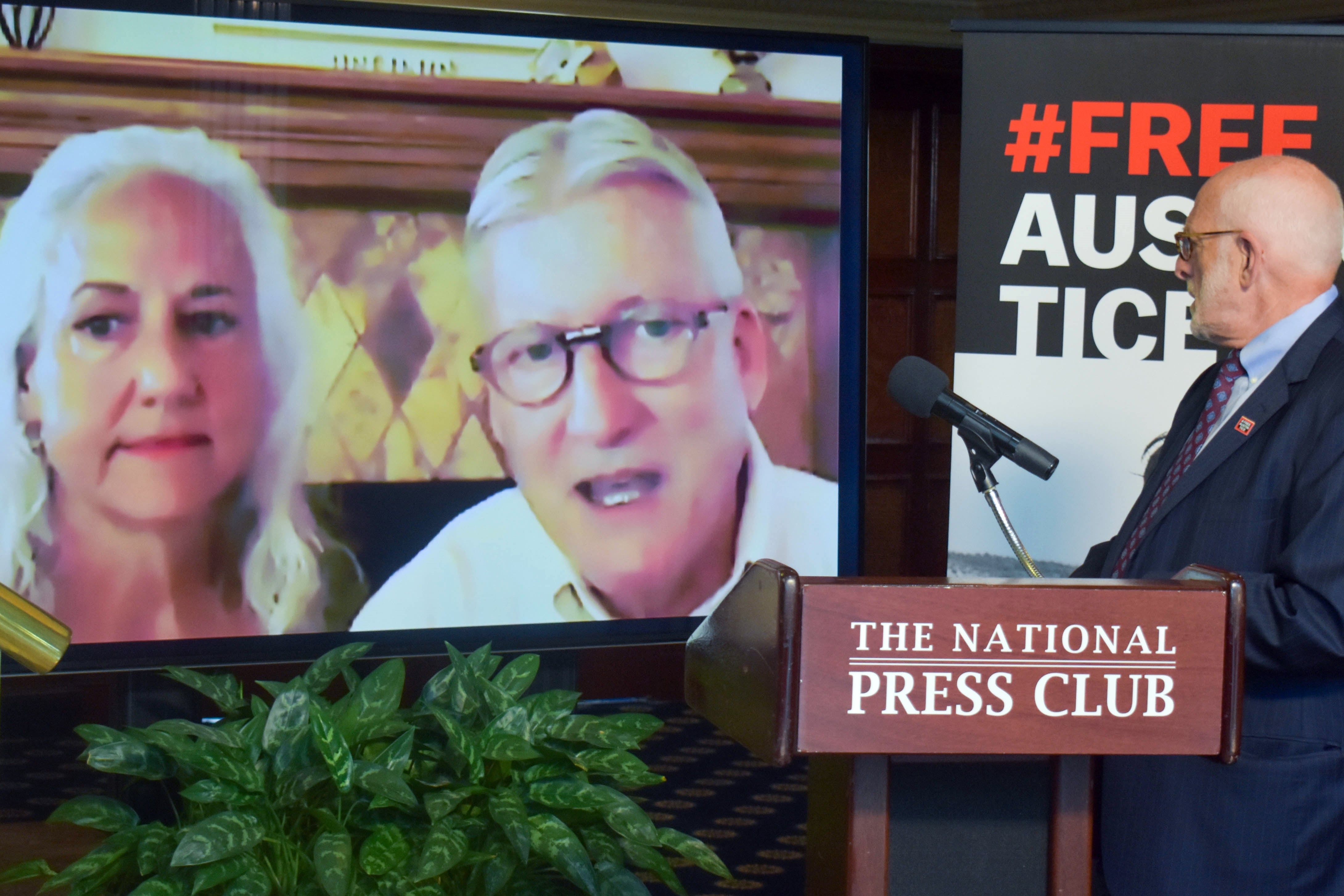On Friday, a “Freedom Clock” is being installed at the National Press Club in Washington.
The clock ticks away, adding seconds, minutes, hours to the time that has passed since Marine veteran Capt. Austin Tice was taken hostage while reporting as a freelance journalist in Syria on Aug. 14, 2012.
Friday marks 2,923 days.
Tice had a birthday only a few days ago. He is now 39. He was taken at age 31. So, nearly all of his 30s have passed in captivity.
Close to a decade of life in which some start careers, get married, buy a house, maybe start a family.
A virtual counter has ticked away the seconds on the austinticefamily.com website as well, one of many efforts the Tice family has taken to keep their son’s fate in the face of those in power and the wider U.S. public.
And somewhere, Tice waits.
At the same National Press Club, in November 2018, then-Special Presidential Envoy for Hostage Affairs Robert O’Brien, told reporters that the government believed Austin was alive.
RELATED

Experts recently interviewed by Marine Corps Times who’ve dealt with the Tice case continue to say there is information to continue to believe Tice is alive.
While officials say much has been going on behind the scenes on many levels with many agencies, ultimately it will come down to the United States and Syria talking, and negotiating directly.
“The fate of Austin coming home is still in the hands of those holding him. Full stop,” said Kieran Ramsey, director of the Hostage Recovery Fusion Cell.
What’s complicated his return are factors that run from the vagaries of world leaders and the muddled nature of Middle East hostages taking at the start to accusations that U.S. government officials stood in the way, deprioritizing hostages over regional policy.
“The difficulty in freeing Austin is due to the very complex and dynamic environment in the region over there,” said Robert Saale, the former HRFC director.
The team was created following a series of hostage incidents in the Middle East in which U.S. prisoners were executed. Saale worked on Tice’s case while he ran the team before retiring less than two years ago.
“It’s almost like a perfect storm of circumstances, sort of inopportune times, where you’ve had chemical strikes by Syrians, followed by retaliatory strikes by the US government. It’s kind of a two steps forward, three steps back process,” he told Marine Corps Times.

“For the last 8 years, that’s why we’ve gained no ground. Because for every bit of progress we’ve made there’s been some incident that pushes us back and puts us in a worse position than when we started,” Saale said. “And just when we get out of that hole then another thing happens that starts the whole process over again.”
The current director of the fusion cell provided a brief statement to Marine Corps Times.
“The Hostage Recovery Fusion Cell continues to advocate, as the voice within the U.S. government for the Tice Family, the pursuit of the expeditious recovery of Austin,” wrote Ramsey, HRFC director. “We remain inspired by the resolute hope of Marc and Debra that we will ultimately prevail over all obstacles and bring Austin safely home.”
Debra Tice, Austin’s mother, has spoken on numerous occasions with Marine Corps Times. She and the rest of the family are continually frustrated, to put it mildly, over their son’s plight.
They’ve held night out events in D.C. and other cities to raise awareness, campaigns exhorting journalists to include asking about their son in interviews with government officials and even conducted a “storm the Hill” event that got signatures from Congressional representatives to support efforts to bring him home.
The Tice family has made TV appearances on nationally televised shows, and recently wrote an op-ed in the Washington Post called for his return. But news of what’s going on to bring him back is guarded for security reasons, officials said.
“The audience that really does need to know what’s going on does, and that’s Austin’s family,” Ramsey said.
That was until March, when President Donald Trump called on Syria to release Tice and read from a letter he’d sent and made comments at a press briefing about the case:
“We have one young gentleman, Austin Tice, and we’re working very hard with Syria to get him out. We hope the Syrian government will do that. We are counting on them to do that. We’ve written a letter just recently, but he’s been there for a long time and was captured long ago. Austin Tice. His mother is probably watching and she’s a great lady. And we’re doing the best we can. So, Syria, please work with us. And we would appreciate you letting him out,” he said.
“If you think about what we’ve done, we’ve gotten rid of the ISIS caliphate in Syria. We’ve done a lot for Syria. We have to see if they’re going to do this. So, it would be very much appreciated if they would let Austin Tice out immediately,” Trump said.
That was the highest profile mention of her son on such a stage, and Debra Tice noted.
“I think the most important thing to notice is the fact that the president is addressing the Syrian government,” she told Marine Corps Times. “I think it’s important to take note of his very diplomatic and respectful tone ― he says, ‘please work with us.’”
“I think all of that shows a dignity and a seriousness that’s remarkable. It’s significant and it’s just another marker of how important this is to him,” she said.
But, shortly after that event, former National Security Adviser John Bolton published his book about his time in the White House titled, “The Room Where it Happened.”
In the book, Bolton claims that though Trump repeatedly had pushed for a hostage exchanges, both Bolton and Secretary of State Mike Pompeo saw it as “undesirable” for other policy aims.
Much of it, according to Bolton, had to do with efforts that he and other government officials were enacting to keep some level of U.S. troops in Syria in early 2019.
“All these negotiations about our role in Syria were complicated by Trump’s constant desire to call Assad on U.S. hostages,” Bolton wrote.
Debra Tice told Marine Corps Times that she was shocked by what she read.
“As Austin’s mother, when I read this quote my heart hears it as the former National Security Advisor gloating that he and the Secretary of State, two Army vets, defied our President and continue to leave my son hostage in Syria,” she said.

State department officials did not respond to requests for comment on the allegations involving Pompeo.
A department official official told Marine Corps Times that the department provided the following statement in an email:
“We are in frequent contact with Mr. Tice’s parents and are deeply saddened as another year goes by without his release,” the official wrote. “We work tirelessly to bring home each and every American hostage and wrongful detainee and will continue to do so until Austin Tice and others are back with their family and loved ones.”
A Friday State Department press release attributed to Pompeo said, “The U.S. government has repeatedly attempted to engage Syrian officials to seek Austin’s release. President Trump wrote to Bashar Al-Assad in March to propose direct dialogue. No one should doubt the President’s commitment to bringing home all U.S. citizens held hostage or wrongfully detained overseas. Nowhere is that determination stronger than in Austin Tice’s case.”
“Special Presidential Envoy for Hostage Affairs Roger Carstens single-mindedly and tirelessly pursues his mission and has my unwavering support. He and I, like the President, want there to be no need for another statement like this a year from now. Austin Tice’s release and return home are long, long overdue. We will do our utmost to achieve that goal.”
Debra Tice has also been puzzled by what she said is a lack of response or public support from the Marine Corps.
Austin Tice had served as an infantaryman in the Marine Corps from 2005 to 2015, getting out as a captain in the reserves. He had two deployments to Iraq and one to Afghanistan, his official Marine Corps service record shows.
Tice had completed his service and was finishing law school at Georgetown University at the time of his capture. He had gotten into Syria during the early stages of the war in 2012 to report for outlets such as McClatchy and had done freelance work for other media companies such as The Washington Post.
Marine Corps Times reached out to past and current Marine Corps leadership. Most declined to comment on the record, some did not respond.
Marine Corps Commandant Gen. David Berger did not facilitate a phone interview request but his staff provided a statement.
“Austin Tice served honorably as a Marine officer when his nation needed him,” Berger wrote. “We should all be appreciative for Tice’s service to the Marine Corps. I am hopeful for his safe and timely return home.”
Debra Tice offered only a simple question to pose to leadership.
“If you were detained would you want your brothers and sisters in arms to be calling for your release?” she said. “Think about what you would want for yourself and get out there and do it.”
Todd South has written about crime, courts, government and the military for multiple publications since 2004 and was named a 2014 Pulitzer finalist for a co-written project on witness intimidation. Todd is a Marine veteran of the Iraq War.





